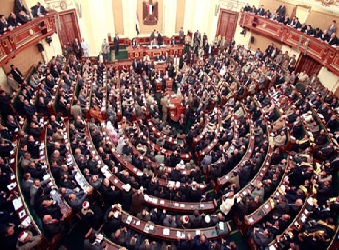The human rights committee of Egypt’s parliament said it will never recommend that the death penalty be abolished, responding to repeated calls from foreign rights groups to end capital punishment.
“Western human rights organisations that lobby for the abolition of the death penalty should know that this goes against both Islamic Sharia and the country’s constitution,” read a statement by the human rights committee on Sunday.
Alaa Abed, head of the committee, told reporters that the abolition of the death penalty would violate Islamic Sharia, which is based on the an eye for an eye and a tooth for a tooth doctrine.
“As long as Egypt’s constitution states that Islamic Sharia represents the main source of legislation in Egypt, parliament can never accept that the death penalty be abolished,” he said.
“The imposition of the death penalty in Egypt takes place only after all legal measures are pursued and after the mufti of Egypt gives final approval.
“Not to mention that the death penalty primarily targets murderers who shed the blood of citizens on purpose, and as a result should be sentenced to death in accordance with Islamic Sharia,” he added.
Abed indicated that parliament also stands against Western organisations which demand that homosexuals and gay marriage be allowed in Egypt.
“Again, I state that this neither goes in line with Islamic Sharia nor with the deep-rooted religious traditions of the Egyptian people,” he added.
Abed said the Human Rights Council affiliated with the United Nations has recently lobbied Egypt to abolish the death penalty.
“But we said in our response that this penalty can’t be abolished because this violates Islamic Sharia, which represents the backbone of legislation in Egypt,” said Abed.
MP Khaled Hammad, a member of the human rights committee, said: “The death penalty is a necessity in a country that is facing a ferocious war against terrorists and criminals.”
“It is incomprehensible that terrorists who kill innocent citizens and who bomb buildings do not face the death penalty. Egypt’s parliament does not support the radical liberal agendas of Western human rights organisations, which show less interest in national security and religious values,” he noted.
Atef Makhaleef, deputy head of the human rights committee, said: “Courts in Egypt have always been keen that the death penalty be imposed on a very limited scale.”
“Many death penalty verdicts had been issued since 2011, but none of them was imposed because they were revoked by supreme courts,” said Makhaleef, adding that “It is better that the death penalty be implemented on a very limited scale rather than abolished altogether.”
Makhaleef also said the number of executions implemented in Egypt decreased largely in recent years.
“I think that those who were executed were just two or three criminals who were found guilty of drug trafficking and espionage,” said Makhaleef.
Nabil Polis, a Coptic MP, said: “The death penalty has become important in recent years because it proved to be a highly effective tool in stemming the tide of terrorist crimes,” Makhaleef added.
Polis said although some Western countries have abolished the death penalty, they still implement other fatal penalties such as gassing murderers or injecting them with poison.
“It is a death penalty but in a different form,” said Polis.
Demands for abolishing the death penalty in Egypt have gained momentum in recent days after the Cassation Court upheld on 20 February death sentences that had previously been handed to 11 defendants in the Port Said stadium massacre case of February 2012.
Source: Ahram online


